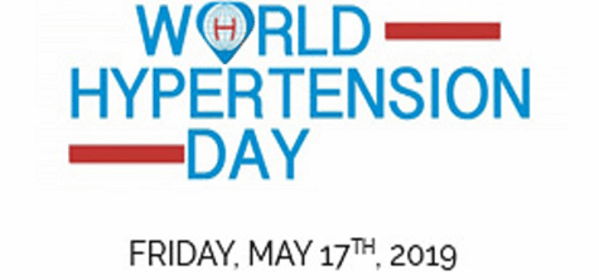
KNOW YOUR NUMBERS – With a goal of increasing high blood pressure (BP) awareness in all populations around the world.
The Heart is a pump designed to force blood through the body and blood is pumped from the Heart through the arteries out to our muscles and organs.
Pumps work by generating pressure and the pressure is a measure of the force that the blood applier to the walls of the arteries.
Blood Pressure depends on a combination of 2 (two) factors.
– How forceful the heart pumps blood around the body
– How narrowed or relaxed the arteries are.
Hypertension (High Blood Pressure) occurs when blood is forced through the arteries at an increased pressure.
Blood Pressure is Measured using two numbers written as 120/80mmHg
– The First Figure is the Systolic Blood Pressure – the maximum pressure in the arteries when the heart contracts (beats) and pushes blood out into the body.
– The Second Figure is the Diastolic Pressure – the minimum pressure in the arteries between hearts when the heart relaxes to fill with blood.
What is classified as high?
In general terms, people with Systolic Pressure consistently above 130mmHg and/or a Diastolic Pressure over 80mmHg are classified as having Hypertension or High Blood Pressure.
Hypertension (HTN) is a chronic medical condition in which the blood pressure is consistently elevated. A typical normal blood pressure would be 120/180mmHg.
Anyone can suffer from High Blood Pressure, but certain factors can seriously aggravate Hypertension and increase the risk of complications.
Factors that Aggravate Hypertension and Increase the Risk of Complication
– A tendency in the family to suffer Hypertension
– Obesity
– Smoking
– High Alcohol Intake
– Excessive Salt Intake
– Lack of Exercise
– Diabetes
– Kidney Disease
– Certain Medicine such as Steroids, Contraceptive Pills.
What can I do once I am Hypertensive?
– Know your numbers – Height, Weight, Blood Pressure and Cholesterol Levels.
– Change your lifestyle.
– Stop Smoking
Lose Weight
– Exercise Regularly
– Cut down on Alcohol
– Eat Healthy Diet
– Cut down on Coffee and high Caffeine drinks such as Cola.
– Reduce Stress in your life to prevent Short-term rises in blood pressure – Try relaxation technique.
Hypertension is not curable and if the blood pressure requires medical treatment, one will probably have to take medicines on a regular basis.
What can the Doctor do?
– Pinpoint risk factors and help change the life-style to reduce blood pressure.
– Offer medication for the reduction of blood pressure and arrange regular monitoring. You may require more than one drug on regular basis to get good blood pressure control.
– Targets for blood pressure control are Systolic pressure of less than 140mmHg and Diastolic Pressure of than 85mmHg
By treating Hypertension well, complications such as:
1 Angina (Chest pain caused by reduced blood flow).
2 Stroke (Bleeding or blood clot in the brain).
3 Heart Failure (Reduced pumping ability)
4 Kidney Failure
5 Eye damage
Can be avoided and average life expectancy will remain almost normal. Without treatment, life expectancy may well be reduced due to the risk of developing complications.
The Medical, Economic and Human Costs of untreated and inadequate control high and inadequately controlled high blood pressure are enormous
a) Health Care Providers face many obstacles to achieving blood pressure control from their patients, including resistance to taking multiple medications to reach blood pressure goals.
b) Patients also face challenges of adhering to medicine schedules and making lifestyle changes.
Nonetheless, the achievement of blood pressure goals is possible and most importantly, lowering blood pressure significantly reduces the risk of death, development of other debilitating conditions and the cost associated with advanced medical care.